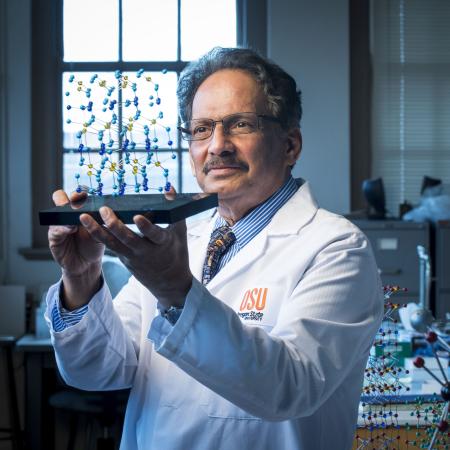The College of Science received $26.7 million in research grants in fiscal year 2014-2015, the highest amount ever received and a 170% increase over last year. Most of the funding came from federal funding agencies, with the National Science Foundation awarding 58% in grants, the National Institutes of Health 15% and the other philanthropic and charitable foundations contributing the remaining 12%.
The funded research projects belonged to diverse subject areas and disciplines, underscoring the tremendous impact Oregon State science faculty are having in human and environmental health, biotechnology, quantitative sciences and alternative energy in Oregon, in the nation and in the world. Nearly one-third of the College’s research funding was a result of the Center for Sustainable Materials Chemistry, which received $8 million in FY 2014-15.
“I am extremely proud of our faculty. With funding rates at many federal agencies at historical lows, the competition for research dollars is fierce for researchers across the country, “ said Sastry G. Pantula, dean for the College of Science. “The ability of our faculty to receive record funding speaks volumes about the quality of our scientific and mathematical research and teaching.”
The increase in College of Science funding is particularly impressive and noteworthy because funding rates in many NIH and NSF programs have been at historic lows since 2013 leading to fierce competition and low success rates for researchers applying to grants. In what may be a positive turnaround, the NIH may receive its first significant funding increase in more than a decade. A Senate panel approved a bill that would bestow a generous $2 billion increase on the NIH in 2016.
In general, however, federal funding agencies are aiming to balance their restricted budgets with the progress of science in the United States by funding projects keeping certain criteria in mind: the most deserving research, a broad portfolio of scientists and the training of students at a wide range of institutions by research-active scientists. Several College of Science faculty received grants over a million dollars:
- Kevin Ahern: Grant from the National Science Foundation to develop the OSU STEM Leaders Program, which fosters undergraduate research through peer and faculty mentorship.
- Elisar Barbar: Grants from the National Institutes of Health and M. J. Murdock Charitable Trust for acquisition of an 800 MHz NMR spectrometer to support studies of biomolecules relevant to human health.
- Douglas Keszler: Grant from the National Science Foundation to support activities in the Center for Sustainable Materials Chemistry focused on environmentally friendly materials to advance electronics and solar energy.
- Bruce Menge: Grant from the David and Lucile Packard Foundation to support the activities of the Partnership for Interdisciplinary Studies of Coastal Oceans (PISCO), which advances understanding of ecosystem, changes and applies knowledge to management of marine resources.
- Rebecca Vega-Thurber: Grant from the National Science Foundation to advance knowledge of the relationships between coral and bacteria while improving our understanding of coral disease to help preserve reef ecosystems.
The grant amount includes awards to faculty who are currently supported by the prestigious NSF CAREER Awards—the NSF’s top award given to junior faculty members for outstanding research and the effective application of that research in university teaching and education—as well as faculty who were awarded highly competitive funds for various research projects, ranging from support for undergraduate mathematics research to the impact of climate change.
The following science faculty also received federal funding for their research:
- Holly Swisher: Grant from the National Science Foundation to support undergraduate research in pure and applied mathematics.
- Dipankar Koley: Grant from the National Institutes of Health to study the biochemistry of dental composites.
- Stephen Giovannoni: Grant from the National Science Foundation to determine what types of dissolved organic matter are oxidized to carbon dioxide by SAR11, the most abundant component of plankton in the ocean.
- Patrick De Leenheer: Grant from the National Science Foundation to apply mathematical modeling to study fish populations in marine protected areas.
- Michael Lerner. Grant from OnTo Technology to study the viability of using recycled materials to manufacture new batteries.
- Rebecca Terry: Grant from the National Science Foundation to study the impact of a century of environmental change on small mammals in the Great Basin.
- Debashis Mondal: CAREER Award from the National Science Foundation to formulate new spatial statistical methods and forecast the impacts of activities on the environment.
- Davide Lazzati: CAREER Award from the National Science Foundation to develop analytical and numerical techniques that will uncover the mysteries of very fine particle formation in interstellar space.
- Paul Cheong: CAREER Award from the National Science Foundation to develop new software methods for applying computational chemistry to study reactions that form complex compounds useful for pharmaceutical technology and the study of biochemical processes.
- Chong Fang: CAREER Award from the National Science Foundation to study the fluorescence mechanisms of emerging fluorescent protein biosensors.
- Ethan Minot: CAREER Award from the National Science Foundation to discover how electron interactions modify the properties of a nanomaterial, thereby generating fundamental knowledge about how to engineer nanomaterials with specific properties.
The College’s research future looks bright. The momentum continues with faculty already garnering significant research awards for 2015-2016. Ryan Mehl, associate professor of Biochemistry and Biophysics, has been awarded two prestigious grants for his work on nitrotyrosine (nitroTyr) proteins and genetic code expansion: a 4-year, $900,835 National Science Foundation award and a 5-year $937,500 National Institutes of Health Award. His project will have a broad educational and scientific impact.




